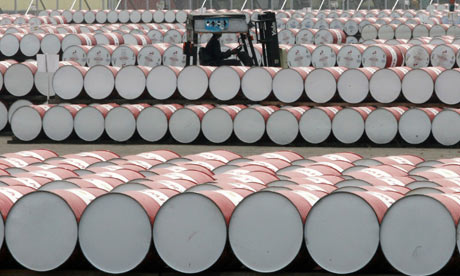What did Obama mean? You can read as well as me.
“We think it would take over a year or so for Iran to actually develop a nuclear weapon, but obviously we don’t want to cut it too close.”
Obama was being interviewed on Israeli TV prior to visiting Israel for the first time.
He said his message to Israel’s Prime Minister Benjamin Netanyahu “will be the same as before: If we can resolve it diplomatically that is a more lasting solution. But if not, I continue to keep all options on the table”.
Before we look at this apparent declaration of war on Iran, let’s throw into the mix some equally bellicose remarks coming out of Europe to arm the Syrian rebels.
“We want the Europeans to lift the embargo,” French President Francoise Hollande said. “Britain and France are agreed on this option … We can’t allow a people to be massacred by a regime which has shown that it doesn’t want a political discussion.”
Little wonder that Egypt has disappeared from the world’s front pages and is hardly mentioned on foreign radio or TV these days. Correspondents from some of the majors have pulled out. Local stringers are on iron rations.
World leaders are contemplating a cataclysm.
Before going off the deep end, let’s take our bearings. The Institute for Science and International Security, a nonprofit research institute, estimates that Iran could produce its first nuclear weapon within six months of deciding to do so. Tehran’s plans to move sensitive nuclear operations into more secure facilities over the course of the coming year could reduce the window for effective military action.
Obama is a second term president with little to show for his presidency so far. Sparring with Republicans like a Chicago soapboxer, he hasn’t put a glove on the international scene.
The infinitesimal shift in Israeli politics gives him a chance. The new Israeli government will be the first in recent memory without ultra-Orthodox Jewish parties. To get a deal Bibi gave a cabinet post to the illegal settlers – but that’s small beer given the wider issues.
Netanyahu keeps his finger on the nuclear trigger – defence and foreign affairs remain with him in the new coalition. That’s why Obama’s apparently off-the-cuff remark that “we don’t want to cut it too close” is intriguing.
Cut what too close?
Obama went on to roll out the usual phrases about hoping to resolve the issue diplomatically and continuing to keep all options on the table. The most credible interpretation must be that Obama wants to end Iran’s nuclear race, which, in reality, means Israel will be given the green light to eviscerate Iran’s nuclear capability with air strikes.
Critics of that argument say only America has the firepower to extinguish Iran’s nuclear threat.
There are two strategies. The first is to bomb Iran’s known key uranium-enrichment facilities in Natanz and Qom. There may be more facilities keeping Iran’s programme alive.
Another strategy would be to target the uranium-conversion plant at Isfahan, the heavy-water reactor at Arak, and various centrifuge-manufacturing sites near Natanz and Tehran, all of which are located above ground and are highly vulnerable to air strikes.
America has developed a new bunker-busting bomb, the 30,000-pound Massive Ordnance Penetrator capable of cutting through up to 200 feet of reinforced concrete, obliterating nuclear facilities such as Natanz and Qom.
Although U.S. precision-guided missiles could pinpoint specific buildings while leaving their surroundings unscathed, such raids would possibly cause the deaths of thousands of civilians, according to military experts.
On the other hand the US could engage in a comprehensive deterrence programme, posting new naval and ground units across the Middle East. It would also have to boost its intelligence capacity to monitor any attempt by Iran to transfer its nuclear capacity within the region.
Israel would require new submarines and ballistic launch facilities to ensure second-strike capability.
The dilemma for Egypt would be how to respond. No doubt Egypt would condemn a US strike against its new friend and ally, Iran. Would Morsi’s Egypt go further and cut off economic ties to the US?
More to the point would Congress do the job for him? There are many in the House and the Senate that want to end all aid to Egypt. How would Egypt position itself in an Arab world dominated by Saudi Arabia and the Gulf States, which would side with America?
Morsi could find himself out on a limb. Which is where he will likely find himself with Europe.
The shift in policy, signalled by Britain and France, will arm Syrian rebels with ground to air missiles to balance the Assad regime’s dominance of the air. Everyone knows where that policy goes: send military advisors to show the rebels what to do and then begin overflying Syria to prevent Assad from knocking the new batteries out.
In other words, the Libyan solution.
It’s no good wringing your hands. Once Britain and France start talking in these terms, warming up public opinion, you know a deal is on its way. When you see Prince Charles walking through a Syrian refugee camp, which his wife describes as ‘heartbreaking’, you know Britain is about to do something drastic. And probably stupid.
Egypt’s response to these upheavals used to be critical. Not as much these days. The friends it chooses measures Egypt’s character. Is Egypt going to continue flirting with Iran? Will it give fulsome support to Syrian rebels, which would upset Iran and Russia?
How will Egypt react to its Western allies if Iran’s nuclear weapons are attacked? Judging by Morsi’s negotiating skills on the Cairo street, catastrophically.
Philip Whitfield is a Cairo commentator.




